Dorothea Shefer-Vanson's Blog, page 9
December 17, 2023
Difficult Times
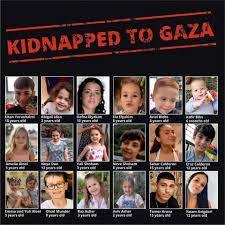
It is hard to write about what’s happening in Israel at the moment. First of all, we keep being told that the IDF is advancing and succeeding in wiping out the Hamas organization whose terrorists invaded Israel a few weeks ago, wreaking havoc in an orgy of bestiality, barbarism and brutality. The results of that event continue to be felt throughout Israel, with over one hundred and thirty hostages still being held in Gaza, undergoing unimaginable suffering. Efforts to rescue them have so far been unsuccessful, often resulting in additional loss of life by those involved in the rescue efforts. And rockets are still being fired from Gaza into Israel, so it seems that all the efforts to destroy that evil organization have not succeeded.
The price of waging war inevitably involves endangering the lives of the soldiers on the ground, and that is what is happening now. In Israel it is hard to avoid the evening routine of watching the nightly TV news programmes when the number and names of casualties are reported. Each morning the agony is repeated when we open the newspaper and see the photos of the fallen soldiers. We are confronted by the smiling faces of young men who were full of talent and promise and whose families are now devastated, or older ones whose loss leaves widows and children bereft. We seem to be going through a never-ending series of disasters. Even people not directly affected cannot help feeling sad at the terrible loss of life. To date over one hundred soldiers have been killed in the line of duty in Gaza.
The suffering of the families of the hostages can only be imagined, and we have to admire their fortitude in standing by one another in their demand that the government do everything in its power to bring their loved ones back. While a negotiated arrangement a few weeks ago did manage to bring a few dozen hostages, mainly women and children, out of captivity, over one hundred and thirty civilians and soldiers are still being held, continuing to undergo physical privation and starvation.
Meanwhile many thousands of Israelis whose homes are near the southern and northern borders of the country have been forced to live elsewhere, away from the constant danger of attack, whether by rockets or terrorist incursion. Their temporary accommodation in hotels far away from their homes leaves them in a kind of permanent limbo, not knowing what they are to do with themselves and when they will be able to return home.
The physical destruction of Gaza and loss of life there is the other side of the coin. The people who live there are not all terrorists, and they, too, are experiencing suffering and deprivation. One’s heart aches for all the families experiencing homelessness, loss of loved ones and the devastation of their way of life. It could be said that they brought their misfortune on themselves by supporting Hamas, but what choice did they have? Hamas imposed itself on the local population and has since made it abundantly clear that their concern is not for the welfare of the inhabitants of the Gaza Strip. By sending their terrorist operatives into Israel to sow death and destruction they set in motion a process that is bringing untold misery to the people for whose welfare they have made themselves responsible.
And now we are told by our government that this situation will continue for many weeks, even months, with who knows what further loss of life on both sides. However, much as I want this war to end, I can’t help agreeing that it is essential to put an end to the threat to Israel from the enemies on its borders, both south and north. Israel has had to fight for its survival ever since its inception, so it looks as if that situation will continue until its enemies accept the fact of its existence. The alternative is just too horrible to contemplate.
December 6, 2023
Family in Reserves
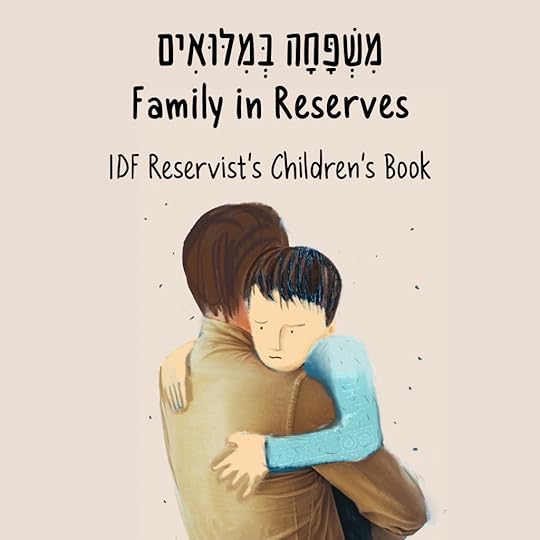
A basic aspect of life in Israel is the requirement that every adult, whether male or female, must serve in the IDF for a few years upon reaching the age of eighteen. While serving in the military, soldiers are trained in one of the many areas in which the IDF engages, whether in a front-line combat unit or in one of the many support units. After being discharged, Israelis are required to be available for annual reserve duty, which usually amounts to two or three weeks of military service each year.
Most Israeli adults who have served in the military for two or three years continue to serve in the reserves until reaching the age at which most of them are no longer required or considered useful. For some individuals this constitutes a turning-point in their lives, while for others it is a blessed release. The period of reserve duty is used to refresh the individual’s knowledge of his or her sphere of activity and also to renew their acquaintance with friends and colleagues serving in the same unit.
When someone is called up to the reserves the rest of the family has to carry on regardless, trying to fill the gap that the individual has left, and hoping that in another week or two their loved one will return and normal family life will resume. In many cases it is the father of the family who is called up, and it is the mother and the children who have to do their best to keep going. Sometimes it is the mother who is called up, and then the reverse is the case, with the father doing his best to undertake the tasks usually performed by the mother of the family. In many cases the extended family, grandparents, uncles and aunts, for example, lend a hand in looking after the family and attending to the various tasks usually undertaken by the missing family member.
In many families the children are simply told, ‘Dad (or Mum) is in the reserves,’ and there is no further explanation of what is involved. The situation is taken for granted, and the children are expected to accept it as just another fact of life. But many young children have no idea what the concept of being in the reserves actually means.
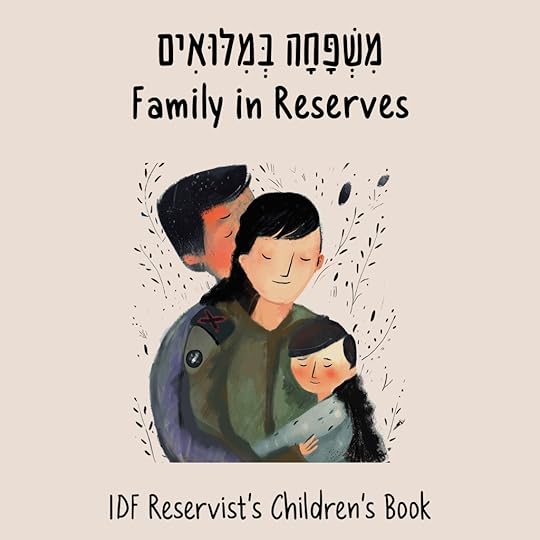
So now one young mother, Talya Tomer, has decided that it’s time to make it clear to children what it means when they are told ‘Dad is in the reserves,’ and has written a book explaining what happens. In order to make the situation clear she has involved another young mother, Daniella Koffler, to illustrate the text, and together they have launched a crowd-funding campaign on the IsraelGives project app (https://my.israelgives.org/en/fundme/miluimbook) in order to raise funds to enable them to publish the book, which will be written in Hebrew and distributed gratis to children of parents who have been called up for reserve duty in the IDF.
November 26, 2023
A Week in London
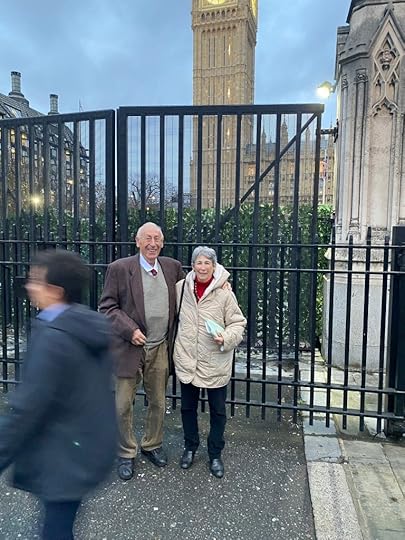
The Israeli government issued a travel warning for all Israelis going abroad. The animosity towards Israel, the massive pro-Palestinian (and hence anti-Israel) demonstrations all over the world threatened the welfare of Hebrew-speakers everywhere. But we had booked long ago to spend a week in London in November and meet friends, preferring to avoid the summer because our visit last year had been spoiled by the searing heatwave of July. And since we speak English we decided to go anyway.
The first thing we noticed when travelling on the tube (underground) was that London is full of foreigners speaking every language under the sun, ranging from Gujarati to Serbo-Croat and all stations in between, and that this didn’t seem to bother anybody. I doubt that the average Londoner would be able to identify Hebrew if he or she heard it and would display animosity to whoever was speaking it. On the contrary, whenever Yigal and I got into a crowded tube carriage younger people immediately vacated their seats to enable us to sit down (presumably our grey hair has that effect).
All the meetings we had arranged with friends (not all of them Jewish) were exciting and heartwarming. People showed sympathy and understanding for Israel’s situation, and were especially kind to us, inviting us to lunch and tea, displaying warmth and affection beyond anything we had anticipated. We were also invited by a friend to lunch at the House of Lords and were able to attend a session and even sit in on David Cameron’s maiden speech there as Lord Cameron of Chipping Norton just after his appointment as Foreign Secretary. His tall, handsome and relatively young presence contrasted starkly with the rather elderly appearance of most of the other members of the House. And of course, his speech was erudite and full of dry English humour. Just seeing the workings of that establishment (procession of the Mace, matters of procedure, frock-coated attendants) was an unforgettable experience.
We were very fortunate in being able to meet old friends, some of them from my schooldays, others from my time at university, and most of them seeming to have grown old gracefully and in reasonably good health.
London has changed in some respects and remained the same in others. Travellers on the tube are now subjected to constant exhortations to take note of anything untoward, upon which they are required to: ‘See it. Say it. Sorted.’ I don’t think my English teacher at school would have approved of that mangled version of the language. ‘Mind the Gap,’ which used to be the catchphrase of choice, seems to have gone out of favour (but there don’t seem to be as many gaps between the train and the platform as before).
Culture in London is still a constant attraction, with plenty of exhibitions, concerts and plays. Since we were limited in time and availability, we ended up attending only one play, ‘Dear England,’ about the difficulties of being the manager of the English soccer team. It was produced and performed in a lively and original fashion, with plenty of fit young men in shorts jumping and running around on the stage, as well as declaiming their parts in a variety of regional accents, which did not help us always to understand what was being said. But it was a spectacle that was presented with a great deal of lively originality, and the ice-cream we had in the interval was as good as ever.
Throughout the week I found myself frequently downing ‘a nice cup of tea,’ whether in our hotel room or outside, and got through the whole week without a single cup of coffee. And of course, the crowning glory was being able to enjoy fish and chips in the local pub. On one of our visits there we met a Canadian couple playing bridge, each with their individual ipad on either side of the table. On another occasion we found ourselves sitting next to a French couple who were evidently enjoying their meal of chicken wings. There’s no denying that England’s time-honoured institutions and way of life are still going strong, attracting tourists and helping the British economy to flourish. We did not encounter a single smidgin of animosity, and were able to return home feeling refreshed and reinvigorated just in time to enjoy watching the return of the first batch of hostages from captivity in Gaza.
November 14, 2023
To Break Russia’s Chains; Boris Savinkov and his Wars Against the Tsar and the Bolsheviks
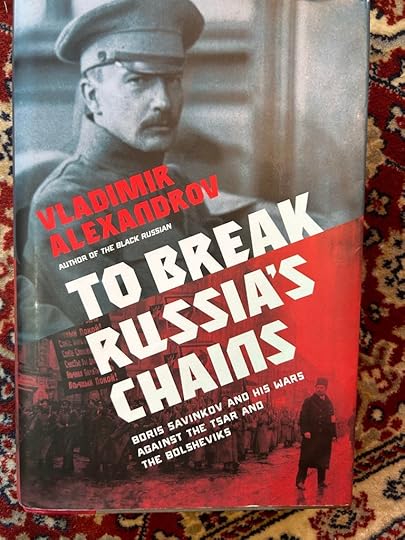
This weighty tome (500 pages) by Vladimir Alexandrov provides a long and fascinating account of the life of an outstanding man who worked tirelessly to overthrow first tsarist rule in Russia and then the Bolshevik regime which replaced it early in the twentieth century. The author’s extensive research enables him to give a detailed description of the life and times of the individual concerned, Boris Savinkov, who also happens to be a very distant relative of mine through my cousin, Serge Savinkov. Along the way, the author paints a vivid picture of the complex and convoluted contemporary events which affected society and politics in Russia and Europe.
At the turn of the twentieth century the Savinkov family, part of the minor Russian nobility, was situated in Warsaw, Poland (then part of Russia), where Savinkov senior held an administrative post. Victor and Sofia Savinkov’s two eldest sons, Boris and Alexander, both radical students at the university of St. Petersburg, were arrested, imprisoned and exiled for varying terms, with grave effects on Alexander’s mental and physical health. Once released, Boris continued to pursue his revolutionary agenda and was involved in organising the assassination of several key figures in the tsarist regime through an anti-Bolshevik organisation known as the Socialist Revolutionaries. Unbeknownst to him, however, the organisation had been infiltrated by a tsarist agent, and he was shadowed by government spies.
Unable to complete his studies in St. Petersburg, Boris moved between various places in Europe, among them Paris, Geneva, Warsaw and Norway, and began engaging in terrorist activities, organising assassinations, raising funds for the Socialist Revolutionaries and meeting like-minded individuals, among them writers and artists. He spent long periods of time in Paris, where he haunted the famous La Rotonde café, which was also frequented at the time by such luminaries as Diego Rivera, Modigliani and others, with whom he established lasting friendships.
The revolution of 1905, when workers gathered in front of the Winter Palace in St. Petersburg in a peaceful protest and were fired upon by the soldiers there, was repressed, but the embers lit then continued to burn, eventually erupting in the October Revolution of 1917, at a time when czarist Russia was embroiled in the First World War, or Great War, as it was then known. Defeats on various fronts and the German-aided insertion of Lenin and Trotsky into Russia enabled the Bolsheviks to seize power, and although armed resistance to their authority – initiated by Savinkov and others – persisted in various forms for several years, ultimately Lenin and the Bolsheviks managed to hold on to power, signing the hated Brest-Litovsk Treaty with Germany in which Russia ceded control of Poland, the Baltic States and Ukraine, thus ending Russian involvement in the war and embarking on a course that tightened Bolshevik control over Russia’s economic, social, agricultural and political life.
Boris Savinkov sought to make Russia a truly democratic, humane and enlightened country, and to achieve this end he spent many years travelling the length and breadth of Europe, meeting with statesmen and financiers, in various attempts to raise armies to attack the Bolshevik regime. Whenever he seemed to be nearing his aim, however, fate would appear to intervene and foil his plans, During these years, which he spent mainly in France, he managed to meet, impress and gain the support of such statesmen as Pilsudski, the Polish prime minister, Masaryk, the Czech premier, and Winston Churchill, then Great Britain’s Minister of Colonial Affairs.
At varous points in his life Boris Savinkov also wrote novels and poetry, which provide insights into the workings of his mind and the ideals that guided many of his actions. In order to entice Boris to return to Russia and face trial the Bolshevik secret service, the Cheka, devised an elaborate plan, and over the course of a year and a half invented a ‘clandestine organisation,’ the Liberal Democrats, that supposedly sought to overthrow the Bolsheviks from within Russia. Although advised by colleagues not to trust this plan, Boris agreed to return to Russia to play a leading role in this so-called organisation, but once across the border was arrested and taken to the renowned infamous prison in Moscow.
While itn prison and during his subsequent trial Savinkov rescinded all his previous beliefs and praised the Bolshevik regime. Whether he did this willingly or in return for certain benefits is not known. In Lubyanka prison Boris Savinkov was given a most luxurious cell, allowed conjugal visits and even taken under guard to theatre performances. After having enjoyed an evening stroll in a park he was waiting with his guards in the Cheka office on the fifth floor before returning to his cell. Suddenly, before anyone could stop him, he rushed to the window and threw himself out, being killed the instant he reached the ground.
The news of his death was kept secret for five days, but eventually a notice appeared in the Moscow newspaper and his few personal effects were returned to his wife. The news of his demise was met with suspicion and it was widely believed that he had been murdered by the Cheka, but according to research by Alexandrov and others, this was in fact what happened. Whether Savinkov felt that he had betrayed the cause he had fought for most of his life, had been the victim of a ruse, or feared lifetime imprisonment his end marked the demise of the search for a more enlightened Russia – one that continues to this day.
I recommend this book wholeheartedly to anyone interested in the history of Russia, or history in general, and have found it to be a well-written, accurate and gripping account of events that have served to create the world we are living in today.
This weighty tome (500 pages) provides a long and fascinating account of the life of an outstanding man who worked tirelessly to overthrow first tsarist rule in Russia and then the Bolshevik regime which replaced it early in the twentieth century. The author’s extensive research enables him to give a detailed description of the life and times of the individual concerned, Boris Savinkov. Along the way, the author paints a vivid picture of the complex and convoluted contemporary events which affected society and politics in Russia and Europe.
I recommend this book wholeheartedly to anyone interested in the history of Russia, or history in general, and have found it to be a well-written, accurate and gripping account of events that have served to create the world we are living in today.
November 8, 2023
Casus Belli

When England declared war on Germany in 1914 and again in 1939 it had not been invaded, its frontiers crossed or its citizens murdered. The basis for the outbreak of hostilities in both instances was simply a mutual defence agreement with other countries.
War is a terrible thing. It involves death, destruction and misery that can end quickly as happened in Israel in 1967 (the Six-Day War), or go on for months or years, as happened with the two world wars of the twentieth century (WWI four years, WWII six years). Whether England was justified in going to war in both cases may be open to debate, but once the country had embarked on that course there was no turning back. The wholesale death and devastation incurred as a result of those two wars had an indelible effect throughout Europe.
Some wars are initiated out of greed or the desire to control more territory and gain wealth, as was the case with many of the wars that raged in the Ancient Near East and Europe from the dawn of history. Some of them are mentioned in the Bible and the annals of the Mesopotamian nations of the time. An enormous bas relief now in the British Museum depicts in gory detail the conquest of Lachish by the Assyrians in the first century BCE. Alexander the Great conquered most of the known world because he wanted to extend the territory he controlled. The Romans conquered and subjugated nations wherever they could in order to extend their empire and enrich Rome. The War of Jenkins’ Ear, which lasted nine years in the eighteenth century, was the result of the long-standing enmity between England and Spain and erupted when Spanish sailors boarded an English ship off the Caribbean coast and cut off the captain’s ear. And let’s not forget Attila the Hun and Ghengis Khan who ruled empires, waged wars and decimated entire populations across huge swathes of Asia and Europe.
So when a heavily-armed band of Hamas terrorists from Gaza entered Israel by force and proceeded to slaughter anyone and everyone they could lay their hands on, including children, babies and the elderly, in the most cruel way imaginable, making sure to film their actions and proudly display them for all the world to see, Israel was well within its rights to retaliate with as much force as it could muster. If the murder of innocent civilians isn’t considered a just cause for declaring war, then what is?
And now there is uproar all over the world at the loss of innocent lives in Gaza. No one is complaining about the way the murderous Hamas rulers embedded themselves in Gaza’s civilian population. And everyone is ignoring the constant barrage of rockets fired from Gaza at Israel’s civilian population. Israel has created a formidable defence system preventing those rockets from wreaking the death and destruction they are intended to achieve. In contrast with Hamas, Israel does not target civilians, but where would we be today if the world had objected to civilian casualties in the Second World War, when the Allies carpet-bombed German cities, especially Hamburg, Dresden and Berlin, in response to the German bombardment of London, Coventry and other cities? Unfortunately, civilian casualties arse an inevitable by-product of war, and anyone who is concerned for the welfare of their population should refrain from initiating hostilities.
November 1, 2023
Collective Trauma

Is there such a thing as Collective Trauma? It seems there is, and Google defines and explains it as “the psychological distress that a group — usually an entire culture, community, or another large group of people — experience in response to a shared trauma. In order to impact the entire group, such traumas are usually devastating in their scope and impact.”
The impact of the horrific attack on innocent civilians in southern Israel by a ‘well-armed band of Hamas terrorists on 7 October 2023 certainly falls into that category. Over one thousand individuals were massacred, over three thousand injured and more than two hundred and twenty people taken captive and brought to Gaza. The effect on Israeli society as a whole can only be defined as traumatic.
Dozens of those taken captive are children, and there’s no knowing what the long-term physical and psychological effects will be on them. The only comparable event in history – and once again it is the Jews who are the target of unbelievable cruelty – is the Holocaust. That event has been described in countless memoirs and personal accounts, and the concept of Inter-Generational Trauma has been employed to define its effect on the Jewish nation. Israel has undertaken the task of commemorating and preserving the memory of that cataclysm, and the phrase ‘Never Again’ is used to underscore the need to ensure that nothing like it ever recurs.
But on that Saturday morning three weeks ago we got a taste of what it was like to live through the Holocaust, as well as a very vivid reminder of the pogroms that ravaged Jewish communities in Europe and Russia throughout the centuries. What is most shocking is that all over the civilized world demonstrations in support of Hamas have been calling for the destruction of Israel. It has been claimed that Iran is behind many of these demonstrations, but that doesn’t make them any less disturbing.
For me personally, as someone who was born and brought up in England, the most horrifying sight was the crowds of people thronging Westminster Bridge and large parts of central London calling for Jihad and chanting slogans in the Arabic language that hark back to Saladin’s defeat of the Crusaders in the Holy Land in the twelfth and thirteenth centuries. The tolerant, cheerful London in which I grew up during the 1950s and 1960s is almost unrecognizable today, with Moslem women wearing black veils and headscarves on every street and in every shop. And although Moslem men are not as readily recognizable, it is they who dominated the London crowd calling for the destruction of Israel. I know that not all Moslems are murderous savages, but the influence of Islam on British society has assumed terrifying proportions, serving as an alarm signal to anyone, and especially Jews, who lives in the UK. The support for Israel expressed by Rishi Sunak, Emmanuel Macron, Joe Biden and other world leaders is helping to assuage my anxiety, but their sentiments tend to be short-lived.
In order to overcome the current trauma we’re advised to refrain from watching the news on TV (not realistic), take a walk in nature or watch a movie. All I have managed to do to distract myself is to read a long book which happens to be a well-written biography of my very distant relative, Boris Savinkov, who took an active part in the Russian Revolution. But it doesn’t really help. I can’t stop thinking about those little children who have been snatched from their homes, some of them without even a parent to comfort them, and marooned without toys in a dank, dark underground space beneath the Gaza Strip, instead of being with their family and friends, free to run and play in the fresh air and sunshine. Of course, the many babies and toddlers who have been butchered have been spared that particular horror.
And I think, too, of my late parents, who escaped Hitler’s talons by the skin of their teeth but were unable to save their own parents. They must have lived with that trauma for many years, though they made a superhuman effort to prevent it from being passed down to us, their children. In the end, however, there was no escape, and my sisters and I are all-too-well-versed in Holocaust history and literature. Living in Israel and raising families of our own made us feel protected in some way, but now I‘m not so sure..
What is happening in Gaza, as the IDF pounds the Strip in an attempt to rout Hamas and possibly (hopefully) to rescue the hostages is perhaps the best remedy for Israel’s collective trauma. The damage inflicted on the population of Gaza is condemned by the civilized world, and also by many Israelis, but without the dissolution of Hamas, which uses its civilian population as a pawn and whose avowed aim is to destroy Israel and kill every Jew, there can be no peace for Israel or the rest of the world.
October 24, 2023
Heartbroken But Not Broken

The eyes of the world are focused on the Gaza Strip at the moment for a variety of reasons. Is Israel going to launch a ground offensive on the northern part of the Strip, after having told the inhabitants there to move south if they want to avoid being killed? And if so, when? Will trucks bearing humanitarian aid continue to bring succour to the beleaguered population of the Strip? After all, why should innocent civilians suffer just because their rulers have committed acts of unspeakable cruelty against the civilians of another country? And will Hamas, the rulers of the area, release the two hundred and twenty Israeli hostages it has seized? Or will they at least allow the Red Cross to visit the hostages and provide them with basic humanitarian aid? Meanwhile, thousands of Israeli citizens living near the country’s northern and southern borders have been obliged to leave their homes in order to avoid being hurt or killed by rocket fire or marauding terrorists.
It doesn’t seem to strike anyone as odd or untoward that for years Hamas has been firing rockets into Israel that deliberately target towns and areas of civilian population. This may be because Israel has managed to equip its people with bomb shelters and safe rooms which have been able to prevent loss of life and limb even when the rockets succeed in getting through the Iron Dome defence system and damage property. And still students on campuses in the USA and elsewhere rally to protest the so-called genocide in so-called Palestine.
Which brings me to a major irony of history –accusing Jews of all people of genocide. While Jews are not the only group that has endured genocide, they were the object of the Nazis’ best efforts to achieve it. There is no genocide of Palestinians by Israel. However, in contrast to the Palestinians, an equivalent number of Jewish refugee from the Holocaust or the mass expulsions of Jews from Arab countries has not been kept in that status for decades. The tiny, nascent and UN-approved State of Israel took them in and did its best to provide them with homes and employment. It did this while at the same time fighting off the attacks by several Arab countries intent on preventing it from continuing to exist.
So Israel is still here, and has succeeded in fighting off attacks by its neighbouring Arab countries at various points in its existence (1967 and 1973 most notably). But on 7th October it failed to prevent the incursion by Hamas terrorists intent on killing as many Jews as possible. On that sunny Saturday morning they succeeded in murdering over one thousand Jewish men, women and children, most of them unarmed civilians just waking up in their homes. The stories that are coming out about their bestiality are so awful that the authorities in Israel have advised people to avoid looking at the video clips from the body-cameras that the terrorists proudly broadcast on social media. The foreign leaders and journalists who have seen those clips have been profoundly shocked. The Hamas terrorists are proud of having sown tragedy and destruction throughout an area that was once peaceful and prosperous. They have killed entire families, made dozens of children orphans, left parents bereft of children, raped women and girls, burned people alive, killed dozens of babies, tortured and beheaded people. They revel in having left the whole country heartbroken and racked with pain and grief.
Maybe by the time you read this the situation will have changed and Israel’s forces have launched their attack, with consequences that are hard to predict. All I can do is to hope that those in charge have learnt their lesson, and will never again allow the forces of evil to pose a threat to the civilian population.
October 18, 2023
Deja Vu
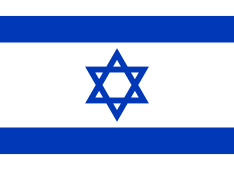
1938
A young couple fled Nazi Germany, found refuge in England and survived the war. Their parents were left behind and murdered. Four years later I was born, thus making them my parents.
1944
V2 rockets fired on London caused the evacuation of children from the city. My two-year old self was sent away to an institution. That was my first experience of war.
1964
As a young university graduate, I came to live in Israel, which I regarded as the place where Jews should live and work to build a country of their own. It also had a sunnier climate and better-looking men than the London I had grown up in. To prove my point, I found and married Yigal.
1967
The threat of war loomed over Israel with Nasser issuing bellicose statements and promising to drive the Jews into the sea. Diplomatic efforts to prevent the outbreak of war failed and Israel was attacked on all sides, resulting in the defeat of all three Arab armies and Israel’s capture of Jordan’s West Bank. I was in the eighth month of my pregnancy but refused to return to England and remained in our home in Jerusalem’s Greek Colony neighbourhood. We had no bomb shelter, but felt relatively safe in our ground-floor apartment, where we were joined by several neighbours from upstairs. We stayed put throughout the six days of the fighting in and around Jerusalem, and I felt that our situation was somewhat akin to that of London during the Blitz. When the war ended I was surprised to find that the buildings around us were still standing after all the noise made by the barrage of shells and bombing. A few days later we were able to visit the Old City of Jerusalem. That was my second experience of war. Our first child, Dana, was born two weeks later.
1973
Our third child was born on Thursday, 4th October. I was still in hospital two days later when the siren sounded. Israel was taken by surprise, Egypt had attacked and the Yom Kippur War broke out. Yigal managed to fetch me from the hospital, and throughout the period of the war I was busy tending to new-born Eitan and our two other children, aged six and three. By then we were living in a second-floor apartment in Abu Tor. From time to time we were obliged to seek shelter in the apartment of our downstairs neighbour, which meant descending three flights of stairs with the baby and two small children. After many weeks of fighting and the deaths of over 2,500 soldiers a ceasefire was declared and the war ended. That was my third experience of war.
2014
Responding to rockets fired towards Israel by Hamas in Gaza, Israel launched a ground invasion, known as Operation Protective Edge (Tzuk Eitan in Hebrew). The objective was to stop Hamas’s attacks and destroy the tunnels they had built under Gaza in order to attack Israel. Our grandson, Gil, was in one of the front-line elite units. Together with his parents and the whole family, we went through a period of intense anxiety until he eventually emerged physically intact. That was my fourth experience of war.
2023
The peace of a sunny Saturday morning was shattered by the sound of the siren, the signal for us to go down to our bomb shelter because rockets were being fired at Jerusalem and the surrounding area. Yigal and I are by now both over eighty years old and living just outside Jerusalem. Fortunately we can still manage to descend the staircase to the basement. The bestial attacks by Hamas terrorists from Gaza, the brutal murder of over a thousand civilians and the capture of almost two hundred hostages have filled us with pain and sadness. We now await the next stage with mounting concern and the hope that our army will succeed in crushing Hamas for good and all.
And yet…
Jewish history is full of tales of woe, of attempts to kill, maim, eradicate and destroy our people. I could go back to centuries of pogroms throughout Europe and Russia or even the Romans. They all failed.
We are still here. Israel is still here. We are here to stay. Israel is here to stay. We are all survivors, and we will endure.
October 11, 2023
Shock, Disbelief, Anger
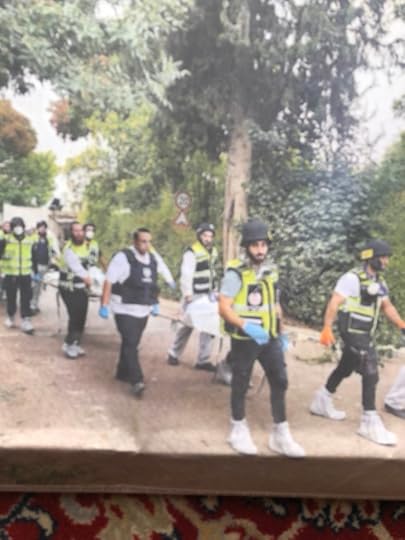
ZAKA – Identification, Extraction and Rescue teams removing bodies, Kibbutz Beeri
The gamut of emotions came hard and fast one after the other last Saturday . The information about rockets fired on southern Israel interrupted a quiet morning as I listened to classical music on the radio and continued with some household tasks. Here in the Judean Hills just outside Jerusalem we are not usually threatened by rockets in the south. But a couple of hours later the first siren sounded and we had to go down to our basement bomb shelter. Two rockets fell in our neighbourhood but no one was hurt.
Then came the news that Hamas terrorists had entered Israel and were causing havoc in the kibbutzim and moshavim along the border with Gaza. My first reaction was disbelief. How could this have happened? After all, we have a complex and sophisticated system of surveillance preventing the entry of terrorists into Israel. Several years ago the army tried to put an end to the tunnels that Hamas had dug beneath Gaza in order to enable terrorists to get into Israel. We had erected a physical barrier and established observation posts along the border.
Later that day, as the hours passed and the realization dawned that the situation was far worse than had initially been revealed I turned the television on and found myself riveted to reports coming from the south accompanied by discussions and analysis in the studio.
It took more than a day or two for the gross enormity of what had happened in the towns and villages in southern Israel to be reported in full. And when I say ‘in full’ I know that what I heard and saw on my TV screen was a sanitized version of the true horrors. The public was warned not to open clips sent via social media, and knowing that I did not want to expose myself to scenes that I would find traumatic, I followed that advice.
Nonetheless, the accounts of people cowering with children and babies in bomb-shelters for hours on end, pleading for help from the supposedly all-powerful IDF, or the stories of hundreds of young people who had been participating in an outdoor party and were slaughtered wholesale by the terrorists or taken captive into Gaza left me in tears, shocked to my core and fuming.
How had this happened? Where were our defence forces? Our intelligence network? Our government? The answer came to me in a flash, and I was not the only one to have these thoughts, though we have been told that this is not the time for calling the authorities to account. That will come later.
I know exactly why it happened. Because the government was busy with the matters designed to keep it in power and Netanyahu out of jail. Its priorities were all askew. Why did they want to make radical changes to the legal system? Why were they prepared to syphon huge amounts of money to the ultra-orthodox who neither work nor serve in the military? Why were budgetary allocations diverted from the health network, social services and the general education system to ultra-orthodox institutions? Why was it necessary to disregard the status quo accord and allow hundreds of Jews to ascend the Temple Mount? Pandering to greedy, selfish, messianic coalition parties is the answer.
Worse still, why did it take so long (almost nine hours) for the IDF to get to the south and rescue those poor souls who had not been murdered or taken to Gaza? Because it was not ready to move. It was stationed throughout the Occupied Territories, protecting so-called religious sites, illegal settlements and hill-top youth whose primary aim is to harass and persecute the local population. The time for recrimination will come, but for now I and many others are simply burning with anger.
October 5, 2023
Demonstrations, Past and Present
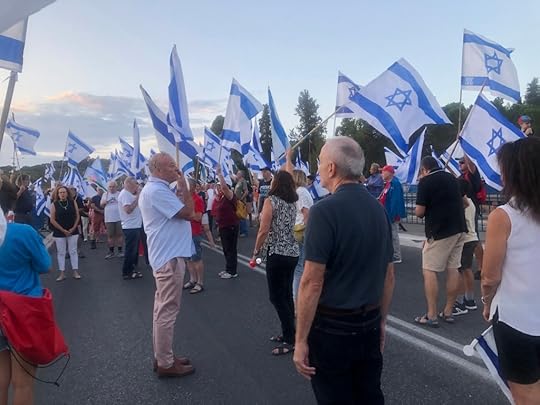
I first participated in a demonstration when I was an impressionable sixteen-year-old, some sixty-five years ago, in those far-off days when England was a nuclear power and still held on to most of its empire. My friends in the youth movement (Bnei Akiva) were going to the CND march, so I went along too. I wasn’t too clear about nuclear disarmament and all that, but it seemed like a good idea, if somewhat unrealistic, to join in the demonstration or march to protest against it. ‘You’re mad,’ my father said. ‘No government will take any notice of a group of crazies, even if they are led by Bertrand Russell.’ The photograph of the event that I still possess shows me sitting with a group of friends holding the pole bearing the Israeli flag, enjoying the weak London sunshine. I don’t think we got as far as Aldermaston, the ultimate target, but we had a nice time.
Of course, in the end, many years later, England did abandon its nuclear weapons, for practical rather than ideological reasons. And probably it had nothing to do with any protest made then or subsequently.
Since immigrating to Israel in 1964 I have not been involved in political activity in any noticeable way. Yigal and I briefly joined a demonstration led by Motti Ashkenazi protesting against the failure of Golda Meir’s government to prevent the Yom Kippur War. That government was eventually re-elected, but called a general election in which it was defeated and replaced by Menachem Begin’s government. I’m still not convinced that we benefited from that change.
A few years later, when Yitzhak Rabin was prime minister and encouraged soldiers serving in the Gaza Strip to ‘break the bones’ of inhabitants of the area who were attacking them and throwing stones, I participated in a demonstration against that policy. I have a vague recollection of spending a Saturday night somewhere with a group of like-minded individuals. No slogans were shouted, and the whole idea was vague, albeit high-minded. We were taken back to our point of departure, and the result was – nothing (until Arik Sharon came along several years later and abandoned the idea of controlling that ungovernable area).
The peaceful demonstrations that have been continuing in Israel for several months aim at stopping the legal revolution which the current government is trying to push through. I have written about it but until last week was unable to participate, mainly because of my own physical limitations (I am 81 after all and no longer a sprightly teenager). But last week I finally managed to make the effort, and joined the local demonstration not far from my home. This was held on the bridge over the main road from Tel Aviv to Jerusalem.
So we stood on the bridge with our flags and were ‘treated’ to loud music followed by speeches over a loudspeaker system. Some of the cars passing on the road below flashed their lights or tooted their horns to indicate their support. A handful of police and border guards stood at either end of the bridge, though I’m not sure whether they were there to protect people from possible opponents or to ensure that the demonstrators didn’t get out of hand (which was highly unlikely since most of them were pacifically inclined). The event ended, as planned, after an hour when, protected by the police, the demonstrators all moved into the road, blocking the bridge for five minutes or so and singing Hatikva, before dispersing and returning home.
It is consoling to know that all over Israel like-minded people continue to join these demonstrations, showing their opposition to policies that they feel are harmful to society and the body politic. So far, however, the government has shown itself to be impervious to these protests. I would hate to think that demonstrating peacefully is turning out to be an exercise in futility.



